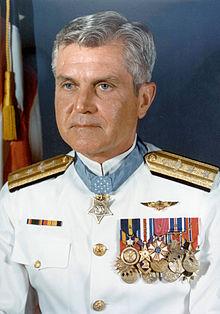
07 Jul WHY A NATIONAL MONUMENT OF AMERICAN HEROES SHOULD INCLUDE A STATUE OF VICE ADMIRAL JAMES STOCKDALE
A statue of the inspirational Medal of Honor recipient Vice Admiral James Stockdale (1923-2005) belongs in “The Garden of American Heroes,” a new national monument to be built per Executive Order. Admiral Stockdale’s motivational example of indomitable patriotism and intrepid leadership occurred when he was America’s senior Prisoner of War (POW) in North Vietnam from 1965-73, all the while braving life-threatening hardships. The Admiral’s refusal to cooperate with his captors under conditions of torture and solitary confinement was the impetus for a culture of POW resistance that included ways to communicate and govern behavior which strengthened morale, bolstered faith in each other and ultimately improved the chances for survival of hundreds of Americans.
I had the honor to meet Admiral Stockdale in September 1979 at a football game in Annapolis. I was a Plebe (freshman) at the US Naval Academy. The Admiral, a 1947 Academy graduate, recently retired from the Navy and was then President of the Citadel. That he graciously shared a few moments to speak with me on a busy afternoon at a major sports event left me with an enduring impression of his friendly, incisive leadership style which emphasized traits I would later describe as “T3.” Specifically,
- TEAMWORK: Admiral Stockdale emphasized – whether in peace, crisis, combat or captivity – individuals must prioritize what’s best for the TEAM ahead of themselves. It was especially true as he led of a diverse group of POWs under circumstances of deprivation few can imagine. The POWs’ team goals were to resist by all means available, remain loyal to each other and country so they could achieve Stockdale’s vision to “Return With Honor.” Great leaders are great communicators and even under arduous conditions of captivity Stockdale was able to share with his team a guideline for behavior in the form of an acronym; BACK US – don’t Bow in public, stay off the Air, admit no Crimes, never Kiss your family or country goodbye, and Unity above Self.
On the home front, Stockdale’s greatest teammate was his loving wife Sybil, with who he co-authored In Love and War: the Story of a Family’s Ordeal and Sacrifice During the Vietnam War which details Sybil’s TEAMWORK with “The League of American Families of POWs and MIAs” which she helped establish to keep Washington focused on this issue affecting thousands of military family members.
- TONE: According to Stockdale, “Character Is Permanent, Issues Are Transient.” His character faced a crucible issue as a POW subject to torture and deprived of medical attention for a broken bones … and it emerged with valor and integrity. Holding a Masters Degree from Stanford, Stockdale had a keen appreciation for the Stoics, an ancient Greek school of philosophy which emphasized self control in face of adversity. The vast majority of POWs followed the Admiral’s selfless example of maintaining character in captivity. Today, Leadership and Ethics organizations teach “The Stockdale Paradox” with attention to the Admiral’s emphasis, “You must never confuse faith that you will prevail in the end … with the discipline to confront the most brutal facts of your current reality.”
- TENACITY: Twice, Admiral Stockdale self-Inflicted near mortal wounds to prove he’d rather perish than capitulate. Once, when he was told that he’d be presented to foreign journalists, Stockdale slashed his scalp with a razor and beat himself in the face with a wooden stool calculating his captors would not display a prisoner who appeared roughed up. A second time, when he learned fellow POWs were dying from torture, he slashed his wrists to demonstrate he preferred death to submission. After both instances, brutal captors abated their excessively harsh treatment of POWs after Stockdale’s valiant and determined action.
The Admiral’s final position in uniform was as President of the Naval War College in Newport, RI. A course he developed on ethics and leadership is still the most popular elective taught today. He later served as President of the Citadel and was a Senior Fellow at Stanford’s Hoover Institute. In 1992 he was the Vice Presidential nominee on Independent candidate H. Ross Perot’s unsuccessful Presidential bid. In 1980 the Navy named its premier annual leadership award in his honor and the US Naval Academy established the Stockdale Center for Ethical Leadership in 1998. His Thoughts of Philosophical Fighter Pilot, a collection of his keynote speeches and essays, is essential reading for any leader.
Building loyal, high performing teams to accomplish a mission with honor and integrity is the pinnacle of leadership. Vice Admiral James Stockdale created such a team of American POWs, regardless of personal sacrifice under the harshest imaginable circumstances. For extraordinary courage, historically conspicuous gallantry and inspirational patriotism his statue belongs in “The Garden of American Heroes.”

Sorry, the comment form is closed at this time.